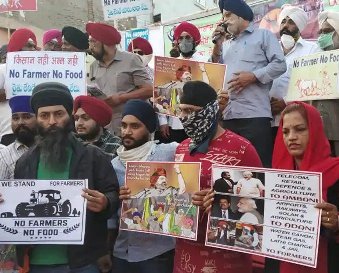

By Sunil Garodia
First publised on 2020-12-08 02:38:41
As the farmers get ready to hold the Bharat Bandh from 11 am to 3 pm today, they have made two things clear: it will be a peaceful strike to press for their demand of repealing the new farms laws and no politicians will be allowed on stage, either to address the farmers or to show solidarity with them.
This is good. There is every chance that either the hotheads among the farmers or even outsiders can resort to violence during the bandh and give the movement a bad name. It happens during strikes called by political parties when party workers go around forcing people to close business establishments. Since the farmers just want to make a point, they should leave it to the people to decide whether they want to support the bandh.
Further, there is every possibility that political leaders will try to hijack the movement. Already, several of them have pledged support. But it is good that none of them have openly tried to be present at the protest sites other than visiting to show solidarity. This is an apolitical movement and must remain so to prevent the government from giving it a political colour. In any case, leaders like Mamata Banerjee have lent only "moral" support and despite warning the government about starting an agitation on the issue, has said that there will be no bandh in West Bengal.
Already, BJP netas have started criticizing the opposition, especially the Congress, for adding fuel to the fire. The BJP says that the Congress had tried to bring in similar farm laws and they were part of its manifesto in 2019. But that should not, and cannot, lessen the gravity of the situation now. What the Congress wanted to do or could have done is not BJP's concern. What it has done, how the act has attracted protest and how it is now going to solve the issue is what the BJP should be applying its mind to. The Prime Minister is right in saying that old laws that have outlived their utility are regressive and anti-development. We needs new laws but these laws must be enacted after addressing the valid concerns of all stakeholders.
There are two ways the problem can be resolved. In the first, both sides must adopt the policy of give and take and find a middle ground. The government must address all the concerns which the farmers have listed. On their part, the farmers must give up their insistence that the government repeal the laws. The second way is for the government to beat a retreat, repeal the laws and come up with new laws that incorporate all things that the farmers want. It is upon the government to decide which way it wants to go and then convince the farmers about it. But this needs to be done at the earliest, if possible in the next round of talks slated for Wednesday. For, if the issue is allowed to linger on, it is likely to become knottier.











